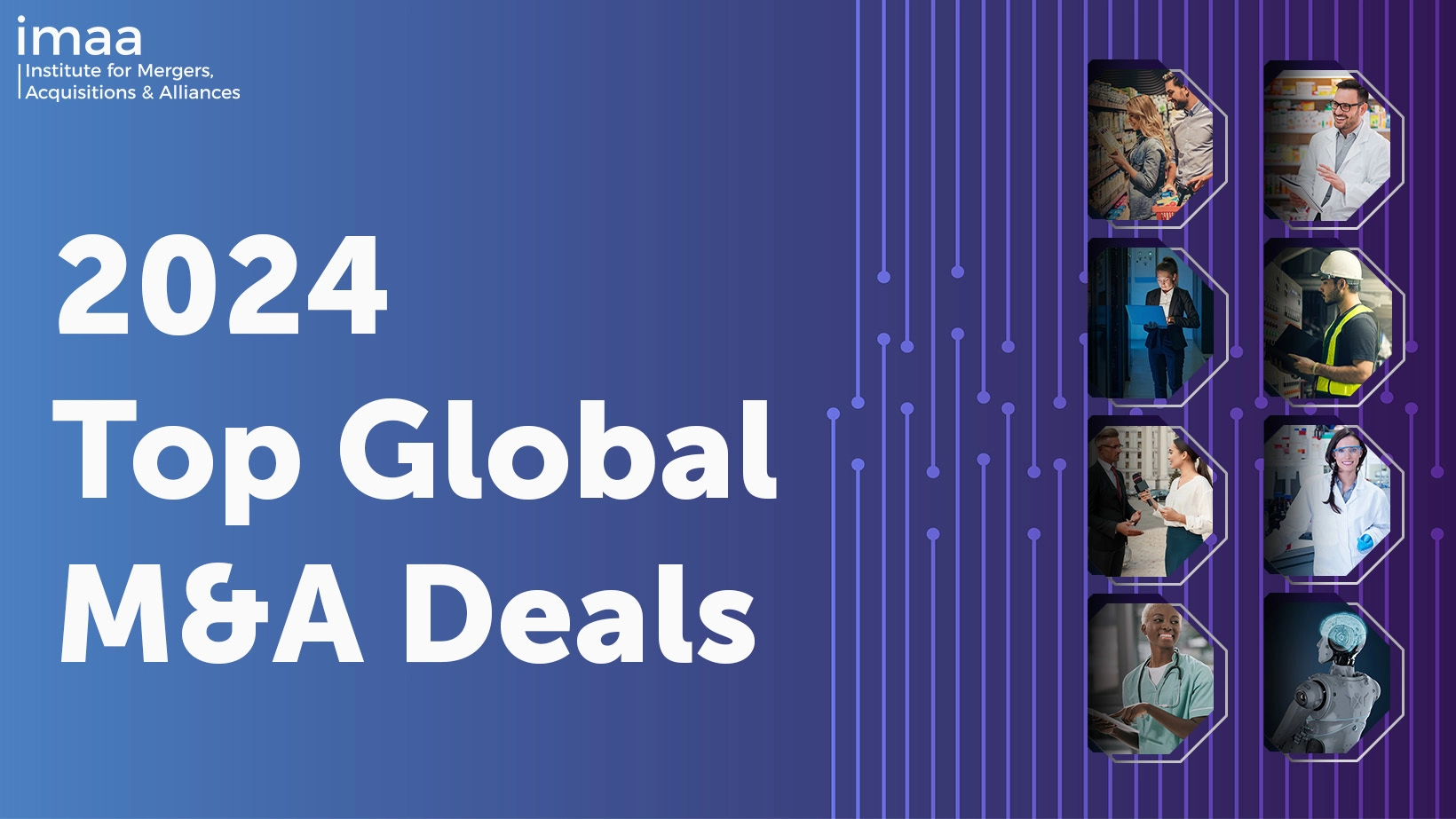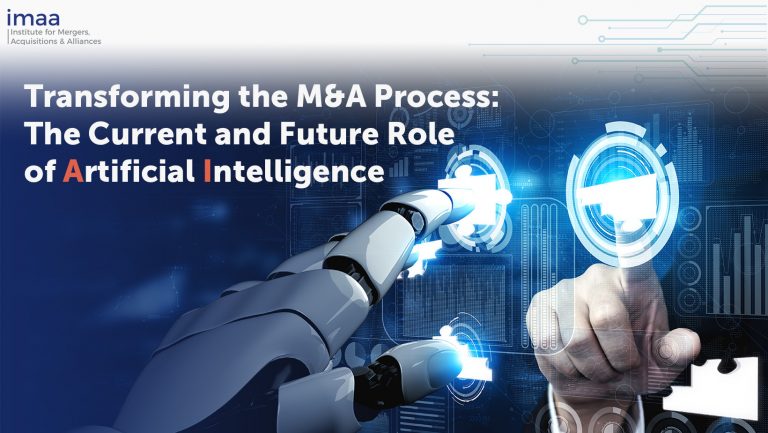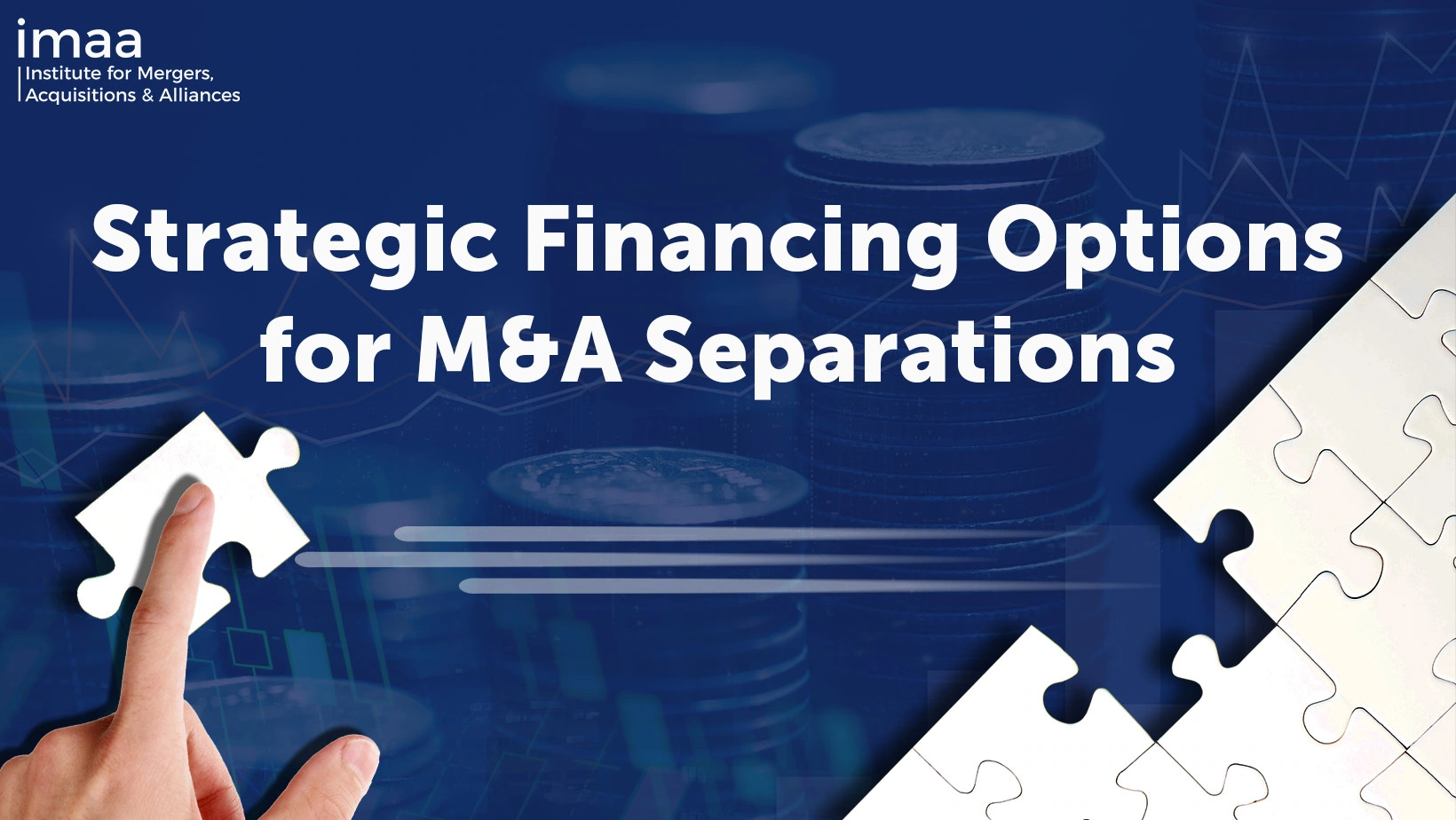
Blog Transforming the M&A Process: The Current and Future Role of Artificial Intelligence
- Blog
Transforming the M&A Process: The Current and Future Role of Artificial Intelligence

SHARE:
Overview

Executive Summary
In the fast-paced realm of mergers and acquisitions (M&A), Artificial Intelligence (AI) has emerged as a game-changer. AI has the potential to reshape the entire process: from strategy, due diligence, valuation to post merger integration as well as separation. This blog post explores and focuses on how AI is already revolutionizing M&A and its potential future impact but will also address the challenges it’s facing and ethical concerns.
- AI-Powered M&A Strategy Formulation: AI is revolutionizing strategy formulation in general but also when it comes to M&A. By providing data-driven insights, AI equips professionals to make better informed decisions, identify unrecognized trends and patterns, and simulate various options.
- Search for Targets and Pipeline Building: AI with the access to the right data, can contribute to building not only a very complete long list and scanning the market for potential targets but also assist when narrowing down the opportunities to creating a short list evaluating the fit (strategically, financial, etc.). AI-driven insights also improve deal selection, reducing the risk of unproductive acquisitions.
- AI-Powered Due Diligence: AI streamlines due diligence by generating data, automating data analysis, spot inconsistencies, risk assessment, and decision-making.
- Valuation and Predictive Analytics: AI-driven valuation models offer more accurate assessments and predictive insights.
- Streamlining Post Merger Integration with AI: integration planning and execution is enhanced through automated workflows, intelligent systems, and cultural alignment facilitated by AI.
- Challenges AI May Face: Challenges include access to data, data privacy, bias, regulatory compliance, and implementation costs. Ethical considerations are also vital.
- Future Trends: Emerging trends include Natural Language Processing (NLP), advanced predictive analytics, enhanced virtual data rooms, cross-platform integration, augmented decision support, and ethical AI frameworks.
- AI is poised to continue transforming M&A, offering:
- enhanced efficiency,
- risk mitigation, and
- new deal opportunities.
Staying informed about AI developments is crucial for leaders in M&A.

Understanding M&A
Before we delve into the dynamic role that AI plays in M&A, it’s essential to grasp the fundamentals of this complex business strategy. M&A refers to the consolidation of companies through various transactions, such as mergers, acquisitions, and takeovers. These transactions are driven by a variety of motives, including gaining access to new markets, technologies, or talent, as well as achieving cost efficiencies and synergies.
The M&A process typically consists of several distinct stages, each with its own set of challenges and opportunities. These stages encompass everything from the initial strategy and target identification to due diligence, valuation, and post-merger integration. The success of an M&A deal depends on the ability to navigate these stages effectively, and this is where AI is increasingly playing a transformative role.

The Evolution of AI in M&A
The integration of AI into the M&A landscape is not a recent phenomenon. It’s part of a broader trend that has seen AI become a cornerstone of innovation across various industries. As AI technologies have matured, their applications have expanded, making them invaluable tools for enhancing decision-making, efficiency, and accuracy.
Historically, the M&A process involved extensive manual data analysis, which was time-consuming and prone to human error. With the advent of AI, this paradigm has shifted dramatically. Today, AI-powered algorithms and machine learning models can process vast amounts of data at speeds incomprehensible to humans. This shift has not only expedited the M&A process but has also introduced new dimensions of analysis and prediction.
In the following sections, we will explore the specific ways in which AI is revolutionizing M&A, from strategy, targets/pipeline building, due diligence to valuation and integration. We will also consider the challenges and ethical considerations associated with this transformative technology. Additionally, real-world case studies will illuminate the practical impact of AI in M&A. As we journey through these insights, it becomes clear that AI is more than just a tool—it’s a game-changer, poised to redefine how M&A deals are conceived, executed, and evaluated.

AI in the M&A Process
Let us review how AI is already having an impact and will continue to transform the M&A process from:
- AI-Powered M&A Strategy Formulation
- Search for Targets and Pipeline Building
- AI-Powered Due Diligence
- Valuation and Predictive Analysis
1. AI-Powered M&A Strategy Formulation: The Starting Point
In the world of Mergers and Acquisitions (M&A), strategy formation is the crucial first step that sets the direction for the entire journey. Companies embark on M&A for various reasons, such as improving financial performance and minimizing risks.
AI is now revolutionizing this initial stage of M&A. It equips professionals with data-driven insights, helping them make informed decisions. AI identifies potential acquisition targets, assesses their alignment with strategic goals, and evaluates risks. Additionally, predictive analytics offered by AI provides a glimpse into future market trends, allowing organizations to fine-tune their strategies accordingly. As AI continues to evolve, it promises to play an even more significant role in shaping M&A strategies, making them data-driven and ready for success right from the start.
2. Search for Targets and Pipeline Building
As AI continues to evolve, its role in M&A expands beyond due diligence and strategy development. Another critical aspect where AI demonstrates its prowess is in targets/pipeline building, a key component of M&A success. Programmatic M&A, an emerging trend, is at the forefront of this transformation.
Traditionally, identifying potential acquisition targets involved extensive manual research and market analysis. However, AI has revolutionized this process by leveraging data-driven insights and automation. Here’s how AI, including programmatic M&A, is shaping the landscape:
- AI-Driven Target Identification: With access to vast datasets and powerful algorithms, AI can swiftly identify high-potential acquisition targets. By analyzing factors such as financial health, market positioning, and growth potential, AI assists companies in building a robust M&A pipeline.
- Continuous Target Screening: Programmatic M&A takes AI-powered target identification to the next level. It involves setting up automated systems that continuously scan the market for potential targets, evaluate their fit with the organization’s objectives, and prioritize them based on predefined criteria. This proactive approach ensures that companies are well-prepared to seize opportunities as they arise.
- Enhancing Deal Selection: AI not only identifies potential targets but also improves deal selection. By assessing historical data and market trends, AI algorithms provide insights into which targets are likely to align most effectively with the company’s strategic goals. This data-driven approach minimizes the risk of pursuing acquisitions that may not yield desired outcomes.
In summary, AI, coupled with programmatic M&A, is revolutionizing how companies build and manage their M&A pipelines. It empowers organizations to proactively identify and evaluate targets, aligning M&A strategies with long-term objectives.
3. AI-Powered Due Diligence
Due diligence is a critical phase in the M&A process. It involves a comprehensive assessment of the target company’s financial, operational, and legal aspects. Traditionally, due diligence has been a costly, labor-intensive process, demanding extensive manual data collection and analysis. However, AI has brought about a transformative shift in this regard. AI not only expedites due diligence but also allows companies to develop stronger M&A strategies.
By automating data analysis and risk assessment, AI streamlines due diligence, providing a deeper and more nuanced view of business realities within a sector or country in real time. Armed with AI, companies can develop more robust M&A strategies, identifying potential synergy opportunities, risks, and hurdles to prepare for integration and post-deal execution.
- Streamlining Data Analysis: AI excels at data analysis, and this capability has a profound impact on due diligence efforts. Machine learning algorithms can rapidly sift through large volumes of data, extracting valuable insights and patterns that might be overlooked by human analysts. Whether it’s examining financial statements, customer data, or legal contracts, AI-powered tools can expedite the process, reducing the time required for due diligence.
- Identifying Risks and Opportunities: One of the primary objectives of due diligence is risk assessment. AI systems are adept at identifying potential risks associated with an M&A deal. They can analyze historical data to uncover red flags, such as financial irregularities or compliance issues. Moreover, AI’s predictive capabilities enable it to anticipate future risks, providing stakeholders with valuable insights into the long-term viability of a deal.
- Enhancing Decision-Making: In the world of M&A, decisions must be made swiftly and with a high degree of confidence. AI contributes to informed decision-making by presenting stakeholders with data-driven insights. These insights can range from predicting the impact of the deal on the combined entity’s financial performance to assessing the cultural compatibility of the merging companies. By providing a data-driven foundation for decision-making, AI helps mitigate the inherent uncertainties of M&A transactions.
- Case in Point: Predictive Analytics: To illustrate the power of AI in due diligence, consider the application of predictive analytics. AI-driven models can assess the historical financial performance of the target company and predict future revenue growth, cost savings, and potential pitfalls. This predictive capacity enables acquirers to evaluate the potential return on investment and make more informed decisions about whether to proceed with the acquisition.
In summary, AI has redefined due diligence in the M&A process by streamlining data analysis, identifying risks and opportunities, and enhancing decision-making. The result is a more efficient and effective due diligence process that reduces the likelihood of post-transaction surprises.
4. Valuation and Predictive Analysis
Accurate valuation is at the heart of any successful M&A deal. The process involves determining the fair market value of the target company, considering factors such as its assets, liabilities, future cash flows, and growth potential. Traditionally, valuation has been a complex and often subjective task. However, AI is revolutionizing this aspect of M&A by introducing data-driven and predictive approaches.
- Data-Driven Valuation Models: AI-driven valuation models leverage vast datasets to refine the valuation process. These models take into account a broader array of variables and market dynamics than traditional valuation methods. By analyzing historical financial data, market trends, and competitive landscapes, AI can generate more accurate and dynamic valuations. This is particularly valuable in industries characterized by rapid change and innovation.
- Predictive Scenarios: AI’s predictive capabilities extend beyond historical analysis. Valuation models powered by AI can simulate various scenarios and assess their potential impact on the value of the target company. For instance, they can project the financial performance of the merged entity under different growth assumptions, market conditions, and cost structures. This enables acquirers to make more informed decisions regarding the price they are willing to pay.
- Real-Time Market Insights: In dynamic M&A environments, timing is crucial. AI tools can provide real-time insights into market conditions, enabling acquirers to capitalize on favorable trends or adjust their strategies in response to changing circumstances. This agility is invaluable when negotiating deals and determining optimal entry points.
- Case in Point: AI-Enhanced Valuation Models: Imagine an M&A scenario in the technology sector, where innovation and market shifts occur rapidly. Traditional valuation models may struggle to keep pace with the evolving landscape. AI-powered valuation models, on the other hand, can ingest vast amounts of data from industry news, financial reports, and patent filings. They can then factor in variables such as emerging technologies and competitive threats to provide a more nuanced and up-to-date valuation.
In conclusion, AI is redefining the M&A valuation process by introducing data-driven, predictive, and real-time capabilities. These enhancements not only improve the accuracy of valuations but also empower acquirers with the insights they need to make strategic decisions.

Streamlining Post Merger Integration and Separation with AI
The post-merger integration phase is a critical juncture in the M&A process. It’s the stage where the merging entities must harmonize their operations, systems, and cultures to realize the full benefits of the deal. This phase is often characterized by complexity, as it involves coordinating a wide range of activities, from IT integration to employee alignment. AI plays a pivotal role in streamlining this integration process.
Automated Workflows
AI-powered automation can significantly reduce the time and effort required for integration tasks. For instance, routine administrative processes, such as data migration and document processing, can be automated with AI-driven tools. This not only accelerates the integration process but also minimizes the risk of errors that can arise from manual data entry.
Intelligent Systems for Decision Support
Complex integration decisions, such as which IT systems to retain or how to restructure organizational hierarchies, benefit from AI-driven decision support systems. These systems can analyze extensive datasets and provide recommendations based on predefined criteria, helping integration teams make well-informed choices that align with the strategic goals of the merger.
Cultural Alignment and Employee Engagement
Cultural integration is often one of the most challenging aspects of M&A. AI can facilitate this process by analyzing employee sentiment through surveys, communication patterns, and other data sources. This insight can guide HR teams in developing strategies to enhance employee engagement and ensure a smoother transition.
Case in Point: AI-Driven Project Management
Consider a scenario where two companies in the financial sector are merging. This merger involves integrating multiple IT systems, aligning compliance processes, and ensuring a seamless customer experience. AI-driven project management tools can create a roadmap for the integration process, assigning tasks, monitoring progress, and flagging potential bottlenecks in real-time. This level of automation and oversight enhances efficiency and reduces the risk of costly delays.
In summary, AI’s ability to automate workflows, provide decision support, and facilitate cultural alignment makes it an invaluable asset in the post-merger integration phase of M&A. By leveraging AI tools and intelligent systems, merging entities can achieve a more seamless and efficient integration process.

Overcoming Challenges
While the integration of AI in M&A offers significant advantages, it’s not without its challenges and potential pitfalls. Acknowledging and addressing these issues is essential for maximizing the benefits of AI in the M&A process.
Data Privacy and Security
The use of AI often involves the processing of vast amounts of sensitive data, which can raise concerns about data privacy and security. M&A transactions may involve sharing confidential financial, legal, and operational information between parties. Ensuring that AI systems adhere to robust data protection standards and compliance regulations is paramount.
Bias and Fairness
AI algorithms are only as impartial as the data they are trained on. If historical data contains biases, AI systems can perpetuate those biases. In M&A, this could lead to unfair assessments of target companies or decisions that inadvertently favor certain groups. It’s essential to continuously monitor and address bias in AI algorithms.
Regulatory Compliance
M&A transactions are subject to a complex web of regulatory requirements, which can vary by industry and jurisdiction. AI can assist in compliance efforts, but it must be implemented in a way that aligns with these regulations. Ensuring that AI systems adhere to legal requirements and industry standards is critical to avoiding regulatory complications.
Technical Challenges and Implementation Costs
Implementing AI in M&A can be technically challenging, especially for organizations that lack the necessary infrastructure and expertise. Additionally, the costs associated with acquiring and maintaining AI systems can be substantial. Organizations must carefully weigh the benefits against the investment required.

Ethical Considerations
In addition to these challenges, ethical considerations are paramount in the adoption of AI in M&A. Responsible AI adoption requires a commitment to transparency, fairness, and accountability. Organizations should:
- Be transparent about their use of AI in the M&A process, ensuring that stakeholders understand how AI systems are being employed.
- Regularly assess AI algorithms for bias and fairness and take corrective action when necessary.
- Establish clear accountability for AI-related decisions and outcomes, ensuring that ethical principles are upheld throughout the M&A process.
- Engage with regulators, industry associations, and other stakeholders to develop ethical guidelines and best practices for AI in M&A.
By addressing these challenges and adhering to ethical principles, organizations can harness the transformative potential of AI in M&A while mitigating associated risks.

Future Trends
The integration of AI in M&A is an ever-evolving journey. As technology continues to advance and businesses adapt to the digital landscape, several emerging trends are shaping the future of AI’s role in M&A.
1. Natural Language Processing (NLP) and Document Analysis
Natural Language Processing, a subfield of AI, is gaining prominence in M&A due to its ability to analyze unstructured text data. NLP algorithms can review contracts, legal documents, and even online news articles to provide insights about potential risks or opportunities in a deal. This technology streamlines due diligence and risk assessment processes, offering a deeper understanding of target companies.
2. Advanced Predictive Analytics
The future of AI in M&A will see more advanced predictive analytics models. These models will not only forecast financial outcomes but also simulate complex scenarios and assess their impact on deal success. Machine learning algorithms will continuously learn from historical data, enabling more accurate predictions and risk assessments.
3. Enhanced Virtual Data Rooms
Virtual data rooms are central to M&A due diligence. AI will play a crucial role in enhancing these platforms by automating data extraction and analysis. This will reduce the manual effort required in document review and improve the speed and accuracy of due diligence processes.
4. Cross-Platform Integration
As businesses increasingly rely on multiple software platforms and data sources, AI will facilitate cross-platform integration during M&A. AI-driven solutions will bridge gaps between disparate systems, ensuring a seamless flow of data and information between merged entities.
5. Augmented Decision Support
AI will become an even more integral part of decision-making in M&A. Augmented intelligence systems will provide M&A professionals with real-time insights, recommendations, and scenario analyses, helping them make informed choices throughout the deal lifecycle.
6. Ethical AI Frameworks
The ethical use of AI in M&A will continue to be a prominent concern. Companies will develop and adhere to AI frameworks that prioritize fairness, transparency, and responsible AI practices. Regulatory bodies may also play a role in setting guidelines for ethical AI adoption in M&A.
These emerging trends indicate that AI’s role in M&A will continue to expand, offering more sophisticated tools and capabilities to dealmakers. As businesses become increasingly data-driven, AI will be at the forefront of driving efficiency, reducing risks, and unlocking new opportunities in M&A transactions.

Conclusion
The integration of Artificial Intelligence (AI) into the M&A process represents a transformative shift that is reshaping the landscape of business transactions. From due diligence to post-merger integration, AI is streamlining operations, enhancing decision-making, and providing valuable insights. Key takeaways from this article include:
- AI-powered due diligence expedites data analysis, risk assessment, and decision-making.
- AI-driven valuation models offer more accurate and dynamic assessments of target companies.
- Automation and intelligent systems streamline post-merger integration.
- Challenges include data privacy, bias, regulatory compliance, and implementation costs.
- Ethical considerations are paramount in the adoption of AI in M&A.
- Real-world case studies illustrate the practical impact of AI in successful M&A strategies.
- Emerging trends point to the continued expansion of AI’s role in M&A, with a focus on NLP, predictive analytics, and ethical AI.

Stay Informed
As AI continues to evolve, staying informed about its developments and applications in the business world is essential. Whether you are a business leader, investor, or professional involved in M&A, understanding how AI can enhance your strategies and decision-making is crucial for staying competitive in today’s dynamic environment.
The synergy between AI and M&A holds immense promise, and its potential is only beginning to be realized. By embracing responsible AI adoption, organizations can harness its power to navigate the complexities of M&A transactions, drive growth, and create value.
In closing, the future of M&A is increasingly intertwined with AI, and those who adapt and leverage this powerful tool are poised to shape the next generation of business transactions.
Thank you for reading, and we encourage you to explore further the ever-evolving relationship between AI and M&A in the dynamic world of business. We invite you to join us at the Institute for Mergers, Acquisitions, and Alliances (IMAA) for an ongoing discourse on this emerging powerhouse.


Stay up to date with M&A news!
Subscribe to our newsletter


